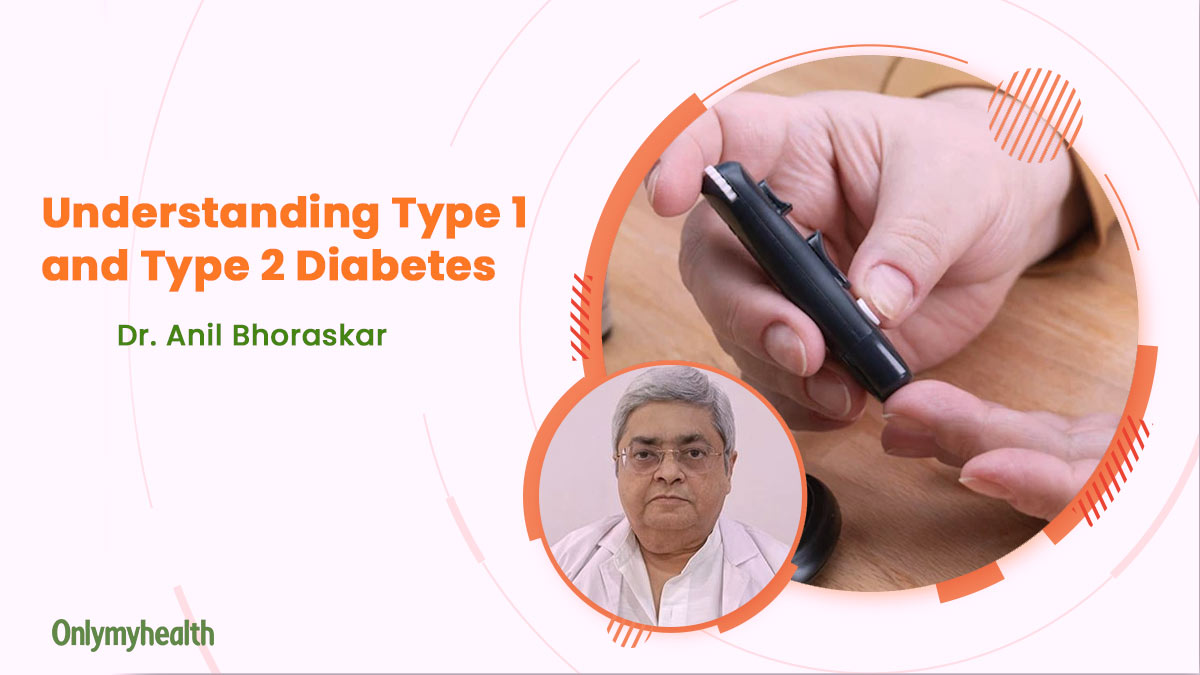
Diabetes is a chronic condition affecting millions of people worldwide. Understanding the key differences between Type 1 and Type 2 diabetes is essential for individuals diagnosed with the disease and those seeking to educate themselves about it. Here's a concise overview of the main contrasts between Type 1 and Type 2 diabetes.
Speaking with the editorial team of OnlyMyHealth Dr Anil Bhoraskar, Senior Diabetologist-SL Raheja Hospital, Mahim & Secretary-Diabetic Association of India (Scientific Section) shares the distinction between type-1 and type-2 diabetes. Here is what he shared with us.
Type 1 Diabetes
Type 1 diabetes, also known as insulin-dependent diabetes, typically develops during childhood or adolescence. It occurs when the body's immune system mistakenly attacks and destroys the insulin-producing cells in the pancreas. As a result, the pancreas produces little to no insulin, leading to elevated blood sugar levels.
Key Points about Type 1 Diabetes
Insulin Dependence
People with Type 1 diabetes require lifelong insulin therapy to control their blood sugar levels.
Autoimmune Disease
Type 1 diabetes is an autoimmune condition, meaning the body's immune system attacks its own cells.
Onset
Type 1 diabetes often develops rapidly, with noticeable symptoms such as excessive thirst, frequent urination, unexplained weight loss, and fatigue.
Risk Factors
While the exact cause is unknown, genetic and environmental factors are believed to contribute to the development of Type 1 diabetes.

Also read: HPV Vaccine: Easiest Way To Get Your Vaccine Against Cervical Cancer In India
Type 2 Diabetes
Type 2 diabetes, also known as non-insulin-dependent diabetes, is the most common form of diabetes. It typically develops later in life, although it is increasingly being diagnosed in younger individuals due to lifestyle factors. In Type 2 diabetes, the body becomes resistant to insulin or does not produce enough insulin to regulate blood sugar effectively.
Key Points about Type 2 Diabetes
Insulin Resistance
Type 2 diabetes is characterised by insulin resistance, where the body's cells become less responsive to insulin, resulting in elevated blood sugar levels.
Lifestyle Factors
Sedentary lifestyle, poor dietary choices, obesity, and genetic predisposition are common risk factors for Type 2 diabetes.
Gradual Onset
Type 2 diabetes often develops slowly, and some individuals may have no noticeable symptoms initially.
Treatment Approaches
Initially, lifestyle modifications such as healthy eating, regular exercise, and weight management are recommended. In some cases, oral medications or insulin therapy may be necessary.
Conclusion
While both Type 1 and Type 2 diabetes involve difficulties in regulating blood sugar levels, they have distinct characteristics and require different approaches to management. If you suspect you have diabetes or have been diagnosed with the condition, it is important to consult with a healthcare professional for an accurate diagnosis, personalised treatment plan, and ongoing support. Understanding the differences between Type 1 and Type 2 diabetes can help individuals make informed decisions about their health and well-being, shares Dr Bhoraskar.







